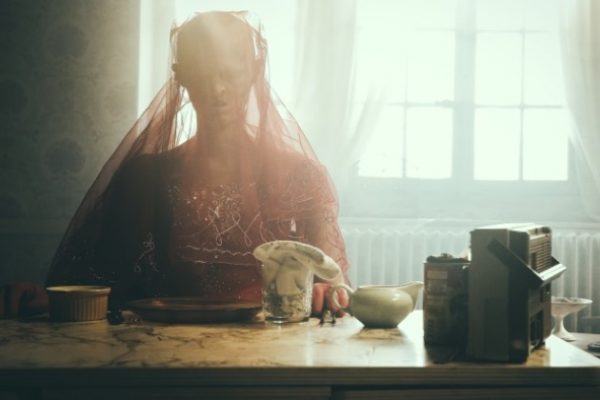@Filmhouse, Edinburgh as part of Dead By Dawn 2019.
Early in the endlessly and imaginatively distressing Tous les Dieux du Ciel, there is a moment of the purest horror. It’s a simple, efficient depiction of horrible inevitability that shrinks the stomach into a tiny molten ball like little else the genre has to offer. It proves to be the seminal moment in the life of Simon (Jean-Luc Couchard) and his sister Estelle (Melanie Gaydos), leading to a spiral of guilt, grief and psychosis. It’s also a startling calling card for a potentially major new voice in horror.
Simon lives alone with Estelle in a large, rural farmhouse, the crumbling walls of which function as a physical metaphor for his tumbledown mental state. Twenty years after a childhood game goes horrifically wrong, Simon cares for the severely disabled Estelle. His bedside manner is mediocre at best, but he refuses all aid from social services in the belief that “They” will come and spirit the pair away to a better life.
Tous les Dieux du Ciel is, for the most part, a meditative character piece with a concerted tone of melancholy. The unease it generates comes from the sense of ambiguity and its depiction of disability. The title translates as, ‘All the Gods in the Sky’ and the long tentacles of Lovecraft can be felt throughout. Simon’s eschatological concerns also bring to mind less overtly horror-focussed pieces such as Jeff Nichols‘ Take Shelter and Lars von Trier‘s Melancholia. While we’re always certain we’re dealing with a person whose sanity has been eroded by trauma, Quarxx is keen to drop little breadcrumbs that hint at something bigger operating behind the scenes.
The depiction of Estelle, played with a captivating and baleful stillness by Gaydos, is perhaps the most upsetting aspect of a very troubling work. Frequently naked as she’s being washed or generally tended to by Simon, she’s stripped entirely of sexuality; presented for the most part as immobile flesh to be cleaned with little agency and even fewer desires. That is until Simon enlists the help of a male escort to service Estelle. The gigolo covers her face before he carries out the deed. It’s a remarkable scene not just in its depiction of a callous action, but it forces us to realise we’ve been complicit in denying Estelle her humanity, and we’ve been led to see her as Simon does. Quarxx’s use of empathy as a means of eliciting horror rather than shocks and gore is deft and skilful storytelling that raises an already very good film to something approaching excellence.
If there are missteps, they lie in incidental characters that seem to serve no real purpose to the narrative. They exist to add a bizarre sense of Lynchian flavour; Fellini-esque grotesques that may add some humorous diversion but are mere padding. A scene in which a social worker finally comes calling is satisfyingly nasty but rather blunt compared to the rest of the film, and there is a final coda that is perhaps unnecessarily drawn-out.
These flaws stop Tous les Dieux du Ciel from being something very special, but this is a startling debut feature that acknowledges its influences while being unique in its own right. With his utilisation of far more than the usual horror tropes, Quarxx debut is hugely impressive and is a statement of intent that promises great things to come.
